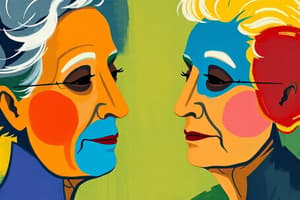Podcast
Questions and Answers
What are some barriers to sexual expression in older adults?
What are some barriers to sexual expression in older adults?
Discomfort, myths, ageism, lack of training in sexual health
What is the difference between glaucoma and cataract?
What is the difference between glaucoma and cataract?
Glaucoma: too much optic pressure, damaging optic nerve, may lead to blindness; Cataract: protein build-up in the lens of the eye, causing blurred vision
What are some consequences of caregiving?
What are some consequences of caregiving?
- Increased frailty (correct)
- Reduced income (correct)
- Higher mortality (correct)
- Early retirement (correct)
Social isolation and mental impairment are major factors that contribute to elder abuse. True or False?
Social isolation and mental impairment are major factors that contribute to elder abuse. True or False?
One in __ Americans age 60 and above experience some form of elder abuse.
One in __ Americans age 60 and above experience some form of elder abuse.
What are the three biggest challenges facing LGBT elders today?
What are the three biggest challenges facing LGBT elders today?
What are the eligibility criteria for Medicare in the U.S.?
What are the eligibility criteria for Medicare in the U.S.?
Flashcards are hidden until you start studying
Study Notes
Demographics of Older Adults
- Increasing number of older adults (65 and above and 85 and above)
Sexuality in Older Adults
- Society regards sexuality in older adults as undignified and asexual
- Barriers to sexual expression include discomfort, myths, ageism, and lack of training in sexual health
- Nurses may share society's ageist beliefs, leading to discouragement of sexual activity
Eye Conditions
Glaucoma
- Caused by too much optic pressure (measured like BP)
- Damages the optic nerve, leading to blindness
- Treated with timolol (β blocker)
Cataract
- Caused by protein build-up in the lens of the eye
- Causes blurred vision
- Treated with laser therapy
Normal Intraocular Pressure
- 10-20 mmHg
Severe Hypokalemia
- Key symptoms: neuropathology prevalence ~50%
Delirium vs Dementia
- (No specific details provided)
Caregiving
Caregivers Composition
- Informal caregivers: persons who care for a relative/friend with no compensation
- Characteristics: personal relationship with recipient, spend several hours/week performing ADLs (activities of daily living)
Consequences of Caregiving
- Financial: early retirement, reduced income, insurance
- Life Quality: high emotional stress (~60%), depression (~40%), physical health (74% concerned about maintaining physical health)
Predictors for Caregiver Health Outcomes
- Stress exposure: general life events, micro-stressors/hassles, caregiver burdens
- Vulnerabilities: age, gender, race, chronic illnesses, personality, lack of education
- Resources: coping, social supports, income
Training Caregivers
- Repetitive behaviors: scenario of Jane's father tapping hands
- Aggressive behaviors: scenario of mom yelling at caregiver
Elder Abuse
- Facts: 1/10 Americans age ≥ 60 experience some form of elder abuse
- 60% of elder abusers: family members
- Vulnerable factors: social isolation, mental impairment (e.g., dementia)
Minority & LGBTQ
- 2020 Profile of Older Americans: challenges facing LGBT elders today include poverty and reduced economic security, health disparities, and social isolation
- Best practice: don't assume all seniors are heterosexual, and recognize seniors have sex lives but may not have safe sex practice and education
Medicare Eligibility
- A U.S. citizen or permanent legal resident who has lived in the U.S. for at least 5 years consecutively
- Eligibility criteria: age, disability, or certain medical conditions
Studying That Suits You
Use AI to generate personalized quizzes and flashcards to suit your learning preferences.




